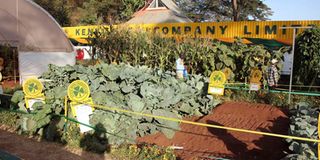Breaking News: At least 10 feared to have drowned in Makueni river
Trouble for ex-Kenya Seed board as EACC starts probe into Sh145m tender

A section belonging to the Kenya Seed Company during a past edition of the Nairobi International Trade Fair. The company is being investigating over alleged procurement irregularities.
The anti-corruption watchdog is investigating alleged procurement irregularities at the Kenya Seed Company.
Detectives are looking into a Sh145 million tender awarded to Syngenta East Africa Ltd, spelling fresh trouble for former board members at the State-owned corporation, including ex-chairman Nathaniel Tum.
In a letter to Kenya Seed, the Ethics and Anti-Corruption Commission (EACC) has summoned members of the board of directors to shed light on the supply of seed treatment chemical to Syngenta during the 2018/2019 financial year.
“Kindly furnish us with original documents in relation to the Tender No. KSC/T/STC/12/2018/2019, the contract agreement for supply and delivery of insecticide for Kenya Seed maize treatment on direct procurement between Kenya Seed Company Ltd and Syngenta East Africa Limited,” the four-page letter says.
Those to be questioned at the EACC North Rift regional office in Eldoret are Dr Tum, Nathan Anaswa, Wilkister Simiyu, Symon Cherogony, Johnson Irungu Waithaka, Abraham Koech, Peter Waweru, Winnie Macharia, Lawrence Njiru and Richard Aiyabei.
Two of the directors appeared at the EACC offices yesterday while the rest are to be grilled today and tomorrow.
Kenya Seed has endured numerous boardroom wars and legal tussles in the recent past over administrative issues.
Earlier this year, Agriculture Cabinet Secretary Peter Munya, in a special gazette notice, appointed Francis Okwara as the new board chairperson and Alice Chesire, Gitonga Kamiti, Kipkorir arap Menjo and Samuel Mecca as board members for a three-year term.
Mr Munya also revoked the appointments of Samson Chelule, Elsbeth Naeku Tolu and Muchohi Ruiru Gikonyo as directors.
But Dr Tum and other officials sued to challenge the appointments.
In March this year, the Moi-era directors staged a fresh boardroom coup as they raced to wrest control from the government.
Private shareholders, led by Dr Tum, summoned an annual meeting of shareholders seeking to appoint new directors, hiring a CEO and declaring dividends for the past six years.
Dr Tum, Soet Kenya Ltd, Paul Kandie, Mr Cherogony, Francis Musau Ndambuki and Libese Levis Sagala filed the suit challenging the appointment of the new directors.
Moi family
Dr Tum was removed as CEO in 2003 amid controversy, following revelations that he had irregularly transferred ownership of the firm to the family of former President Daniel arap Moi.
The battle for control of Kenya Seed has also been in and out of courts for years - including Dr Tum’s 2014 attempt to oust government-appointed directors through a shareholder meeting.
Dr Tum has a 3.89 per cent direct stake in the company.
Kenya Seed’s troubles started in 2001 when the management, under Dr Tum, issued new shares and sold them to the Moi-era elite in a transaction that diluted the government’s stake from 52.8 per cent to 40 per cent.
Shareholders who owned 60 per cent of the shares sued to challenge the appointments of the new office-bearers after they were kicked out of the annual general meeting chaired by Stanley Kamau, who was seconded from the National Treasury to oversee the polls.
Before 2001, the Agricultural Development Corporation (ADC) had 52 per cent shares while private shareholders had 48 per cent, and hence five and four positions respectively for director.
But this was reviewed after 2001 when ADC shares were slashed to 40 per cent, meaning it was entitled to four state directors while private shareholders increased to 60 per cent, hence six directors.
They, however, agreed to review the directorship, with ADC maintaining four while private shareholders lost one director to allow the managing director of Kenya Seed to join the board.
Ownership of Kenya Seed is contested, with private shareholders claiming a 60 per cent stake while the government reckons the firm is a parastatal.
The entry of ADC, and later Kenya Farmers Association (KFA), saw ADC – over a period – hold about 53 per cent of the shares.
But the firm was being privatised by managers who did not want outsiders to participate.
When the sale was floated on July17, Nathaniel Tum, who had been Kenya Seed MD for about two decades, took about 67 per cent of the subscribed 3,370,000 new shares valued at more than Sh90 million.





